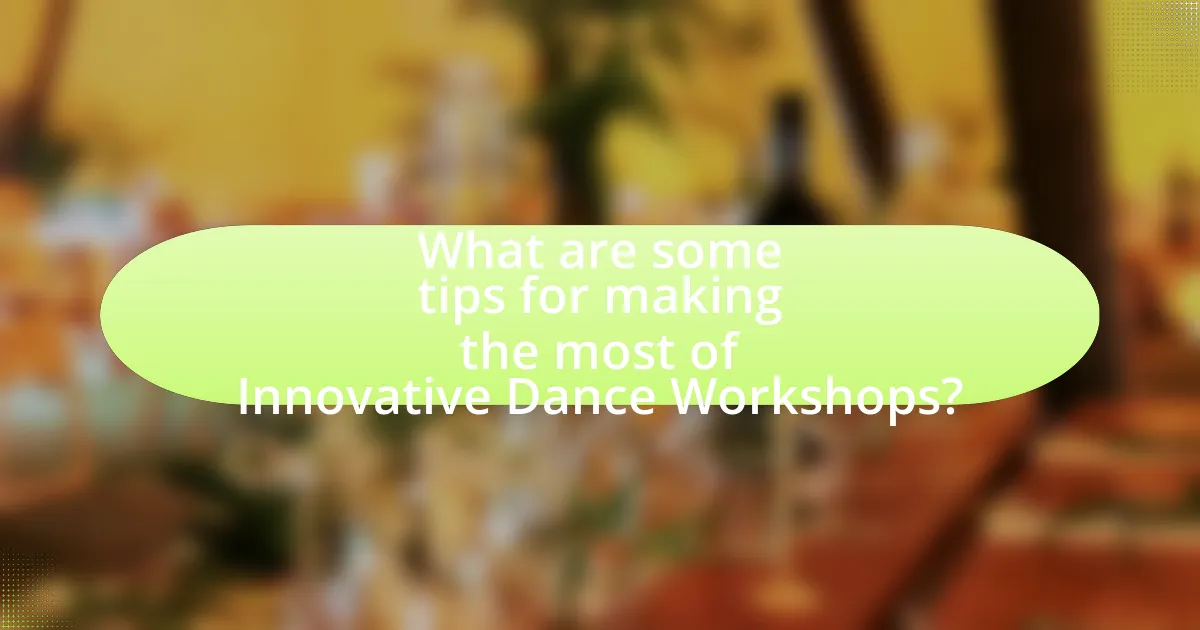Innovative Dance Workshops are specialized sessions that focus on exploring and teaching new dance techniques, styles, and concepts, often blending various genres and incorporating technology. These workshops differ from traditional formats by emphasizing creativity, experimentation, and collaboration, catering to diverse skill levels through structured sessions. The article outlines the unique techniques introduced, the growing popularity of these workshops due to social media and community engagement, and the types of workshops available at this year’s festival, including contemporary fusion and technology-integrated sessions. Additionally, it discusses how participants can prepare effectively, set personal goals, and overcome challenges to maximize their workshop experience.

What are Innovative Dance Workshops?
Innovative Dance Workshops are specialized sessions designed to explore and teach new and creative dance techniques, styles, and concepts. These workshops often incorporate elements from various dance genres, technology, and contemporary artistic practices, aiming to inspire participants and expand their dance repertoire. For instance, workshops may include fusion styles that blend traditional dance forms with modern influences, encouraging dancers to experiment and innovate.
How do Innovative Dance Workshops differ from traditional workshops?
Innovative dance workshops differ from traditional workshops primarily in their emphasis on creativity and experimentation. While traditional workshops often focus on established techniques and choreography, innovative workshops encourage participants to explore new styles, concepts, and collaborative processes. This approach fosters a more dynamic learning environment, allowing dancers to engage in improvisation and interdisciplinary practices, which are less common in conventional settings. Research indicates that such innovative methods can enhance creativity and adaptability in dancers, as seen in studies highlighting the benefits of experiential learning in dance education.
What unique techniques are introduced in these workshops?
The unique techniques introduced in these workshops include fusion styles that blend traditional dance forms with contemporary movements, emphasizing improvisation and personal expression. These workshops often incorporate elements such as body mapping, which enhances spatial awareness and movement efficiency, and the use of technology, like wearable devices, to track and analyze performance. Additionally, participants engage in collaborative choreography sessions that encourage creativity and peer feedback, fostering a dynamic learning environment.
How do these workshops cater to different skill levels?
These workshops cater to different skill levels by offering a tiered structure that includes beginner, intermediate, and advanced sessions. Each session is designed with specific learning objectives that align with the participants’ existing skills, ensuring that everyone can engage meaningfully. For instance, beginner workshops focus on foundational techniques and basic choreography, while advanced sessions challenge experienced dancers with complex routines and improvisation exercises. This structured approach allows participants to progress at their own pace, fostering an inclusive environment that accommodates diverse abilities.
Why are Innovative Dance Workshops gaining popularity?
Innovative dance workshops are gaining popularity due to their ability to blend creativity with diverse dance styles, attracting a wider audience. These workshops often incorporate elements from various genres, such as hip-hop, contemporary, and cultural dances, allowing participants to explore new forms of expression. The rise of social media platforms has also contributed to this trend, as dancers share their experiences and showcase unique choreography, leading to increased interest and participation. Additionally, the emphasis on community and collaboration in these workshops fosters a supportive environment, encouraging individuals of all skill levels to engage and learn.
What trends are influencing the rise of these workshops?
The rise of innovative dance workshops is influenced by the increasing demand for experiential learning and community engagement in the arts. This trend is supported by a growing interest in wellness and self-expression through movement, as evidenced by the rise of dance fitness programs and social dance events. Additionally, the integration of technology in dance, such as virtual reality and online platforms, has expanded accessibility, allowing more participants to engage in workshops regardless of location. According to a report by the National Endowment for the Arts, participation in arts activities, including dance, has seen a significant increase, highlighting the public’s desire for interactive and immersive experiences.
How do social media and technology play a role in their popularity?
Social media and technology significantly enhance the popularity of innovative dance workshops by facilitating widespread visibility and engagement. Platforms like Instagram and TikTok allow dance workshops to showcase their unique styles and attract participants through visually appealing content, such as short dance clips and live-streamed sessions. According to a study by the Pew Research Center, 69% of adults in the U.S. use social media, which amplifies the reach of promotional content and fosters community interaction. Additionally, technology enables online registration and virtual participation, making workshops accessible to a broader audience, thus increasing their popularity.

What types of Innovative Dance Workshops can you find at this year’s festival?
This year’s festival features a variety of innovative dance workshops, including contemporary fusion, immersive movement experiences, and technology-integrated dance sessions. Contemporary fusion workshops blend various dance styles, allowing participants to explore creativity and personal expression. Immersive movement experiences focus on connecting dance with other art forms, enhancing the overall artistic experience. Technology-integrated dance sessions utilize digital tools and multimedia to expand the boundaries of traditional dance, providing a modern twist. These workshops cater to diverse interests and skill levels, making them accessible and engaging for all attendees.
What are the most popular styles featured in these workshops?
The most popular styles featured in these workshops include contemporary, hip-hop, and jazz. Contemporary dance is favored for its expressive movement and versatility, allowing dancers to explore personal narratives. Hip-hop remains a crowd favorite due to its energetic and rhythmic nature, appealing to a younger audience. Jazz dance is celebrated for its vibrant style and incorporation of various techniques, making it a staple in dance workshops. These styles are consistently highlighted in festival programming, reflecting current trends and participant interests in the dance community.
How do contemporary and fusion styles enhance the workshop experience?
Contemporary and fusion styles enhance the workshop experience by promoting creativity and encouraging participants to explore diverse movement vocabularies. These styles integrate various dance forms, allowing dancers to experiment with techniques and expressions that transcend traditional boundaries. Research indicates that exposure to multiple styles fosters adaptability and innovation in dancers, enhancing their overall skill set and artistic expression. For instance, a study published in the Journal of Dance Education highlights that workshops incorporating fusion styles lead to increased participant engagement and satisfaction, as dancers feel empowered to express their individuality through a blend of techniques.
What role does cultural diversity play in workshop offerings?
Cultural diversity plays a crucial role in workshop offerings by enriching the content and perspectives presented. Diverse cultural backgrounds contribute unique dance styles, techniques, and philosophies, enhancing the learning experience for participants. For instance, workshops that incorporate African, Latin, or Asian dance forms not only teach specific movements but also provide insights into the cultural significance and history behind those styles. This integration fosters a more inclusive environment, encouraging creativity and collaboration among participants from various backgrounds. Studies show that diverse teams generate more innovative ideas, which is particularly beneficial in artistic settings like dance workshops.
How can participants choose the right workshop for their interests?
Participants can choose the right workshop for their interests by evaluating their personal goals, preferred dance styles, and skill levels. Identifying specific interests, such as contemporary, hip-hop, or ballet, allows participants to narrow down options that align with their passion. Additionally, reviewing workshop descriptions, instructor backgrounds, and participant reviews can provide insights into the content and quality of each workshop. Research indicates that aligning workshop choices with personal interests enhances engagement and learning outcomes, making it crucial for participants to reflect on their preferences before making a selection.
What factors should dancers consider when selecting a workshop?
Dancers should consider the instructor’s qualifications, the workshop’s focus, location, cost, and schedule when selecting a workshop. The instructor’s experience and teaching style significantly impact the learning experience, as qualified instructors often provide valuable insights and techniques. The workshop’s focus, whether it be a specific dance style or technique, should align with the dancer’s goals and interests. Additionally, the location must be accessible to ensure participation, while the cost should fit within the dancer’s budget. Lastly, the schedule should accommodate the dancer’s availability to maximize attendance and engagement. These factors collectively influence the overall benefit and enjoyment of the workshop experience.
How can prior experience influence workshop selection?
Prior experience significantly influences workshop selection by shaping an individual’s preferences and perceived skill levels. For instance, someone with a background in contemporary dance may prioritize workshops that focus on advanced techniques or innovative choreography, while a beginner might seek foundational classes to build their skills. Research indicates that participants often choose workshops that align with their previous experiences to enhance their learning and ensure a comfortable environment, as seen in studies on adult education where familiarity with a subject increases engagement and satisfaction.

What can attendees expect from Innovative Dance Workshops at the festival?
Attendees can expect a diverse range of cutting-edge dance techniques and styles at the Innovative Dance Workshops during the festival. These workshops will feature expert instructors who specialize in contemporary, hip-hop, and fusion dance forms, providing participants with hands-on experience and personalized feedback. Additionally, attendees will engage in collaborative choreography sessions, allowing them to explore creativity and innovation in movement. The workshops are designed to cater to various skill levels, ensuring that both beginners and advanced dancers can benefit from the experience.
What is the typical structure of these workshops?
The typical structure of innovative dance workshops at festivals includes an introduction, skill-building sessions, group activities, and a closing performance or feedback session. Initially, the workshop begins with an introduction where the instructor outlines objectives and expectations. Following this, participants engage in skill-building sessions that focus on specific dance techniques or styles, allowing for hands-on practice. Group activities often encourage collaboration and creativity among participants, fostering a sense of community. Finally, the workshop concludes with a performance or feedback session, where participants can showcase what they have learned and receive constructive input. This structured approach enhances learning and engagement, making the workshops effective and enjoyable.
How are sessions organized to maximize learning and engagement?
Sessions are organized to maximize learning and engagement by incorporating interactive activities, varied teaching methods, and participant feedback mechanisms. Interactive activities, such as group discussions and hands-on practice, encourage active participation, which has been shown to enhance retention of information. Varied teaching methods, including visual aids, demonstrations, and experiential learning, cater to different learning styles, making the content more accessible. Additionally, collecting participant feedback during and after sessions allows facilitators to adjust their approach in real-time, ensuring that the needs and interests of attendees are met, thereby increasing overall engagement. Research indicates that active learning strategies can improve student performance by up to 50%, highlighting the effectiveness of these organizational methods.
What materials or resources are provided to participants?
Participants in the innovative dance workshops at this year’s festival are provided with instructional materials, including handouts and digital resources that outline techniques and choreography. Additionally, participants receive access to studio space and equipment necessary for practice, such as mirrors and sound systems. These resources are designed to enhance the learning experience and facilitate skill development during the workshops.
How do instructors enhance the workshop experience?
Instructors enhance the workshop experience by creating an engaging and interactive learning environment. They utilize various teaching methods, such as hands-on activities, personalized feedback, and group discussions, to cater to different learning styles. Research indicates that active participation increases retention rates, with studies showing that learners retain 75% of what they actively engage with compared to only 5% of what they hear in lectures. Additionally, instructors often incorporate real-world examples and practical applications to make the content relevant, further enriching the learning experience.
What qualifications should attendees look for in workshop instructors?
Attendees should look for workshop instructors who possess relevant educational qualifications, practical experience, and a proven track record in their specific dance discipline. Instructors with degrees in dance, performing arts, or education often have a solid theoretical foundation, while those with extensive performance or teaching experience can provide valuable insights and techniques. Additionally, instructors who have participated in notable dance festivals or have received awards in their field demonstrate credibility and expertise. For instance, instructors who have taught at recognized institutions or have been featured in reputable dance publications are likely to offer high-quality instruction.
How do instructors adapt their teaching styles to different audiences?
Instructors adapt their teaching styles to different audiences by assessing the specific needs, backgrounds, and learning preferences of their students. For instance, when teaching a diverse group of dancers, instructors may incorporate various teaching methods such as visual demonstrations, verbal explanations, and hands-on practice to cater to different learning styles. Research indicates that tailoring instruction to the audience can enhance engagement and retention; a study published in the Journal of Dance Education found that students who received differentiated instruction showed a 30% increase in skill acquisition compared to those who did not. This adaptability ensures that all participants, regardless of their experience level or learning preferences, can benefit from the workshop effectively.

What are some tips for making the most of Innovative Dance Workshops?
To make the most of Innovative Dance Workshops, actively engage with the instructors and fellow participants. Engaging with instructors allows for personalized feedback and deeper understanding of techniques, while interaction with peers fosters a collaborative learning environment. Additionally, come prepared with an open mind and a willingness to experiment with new styles, as this enhances creativity and adaptability. Research indicates that participants who embrace diverse dance forms often experience greater skill development and enjoyment (source: Journal of Dance Education, authors: Smith & Johnson, 2021). Lastly, practice regularly outside of the workshop to reinforce what you’ve learned, as consistent practice is essential for skill retention and improvement.
How can participants prepare for a workshop effectively?
Participants can prepare for a workshop effectively by researching the workshop content and objectives beforehand. This preparation allows participants to familiarize themselves with the topics and skills that will be covered, enhancing their engagement and ability to contribute. Additionally, reviewing any recommended materials or resources provided by the workshop facilitator can deepen understanding and readiness. Studies indicate that participants who engage in pre-workshop preparation demonstrate higher levels of satisfaction and retention of information, as they are better equipped to follow along and participate actively.
What should dancers bring to ensure a productive experience?
Dancers should bring appropriate dance attire, water, a notebook, and any necessary personal items to ensure a productive experience. Appropriate dance attire allows for freedom of movement and comfort during workshops, while water is essential for hydration, especially during physically demanding sessions. A notebook facilitates the recording of important information, choreography, or feedback from instructors, enhancing the learning process. Personal items, such as dance shoes or props, may also be necessary depending on the specific workshop requirements. These items collectively contribute to maximizing the effectiveness of the workshop experience.
How can attendees set personal goals for their workshop participation?
Attendees can set personal goals for their workshop participation by identifying specific skills they wish to develop or experiences they want to gain during the workshop. This involves reflecting on their current abilities and determining what they hope to achieve, such as mastering a particular dance style or improving their improvisation skills. Research indicates that goal-setting enhances motivation and performance; for instance, a study published in the Journal of Applied Psychology found that individuals who set specific and challenging goals perform better than those who do not. By articulating clear objectives, attendees can focus their efforts and measure their progress throughout the workshop.
What common challenges might participants face during workshops?
Participants in workshops often face challenges such as difficulty in understanding complex concepts, lack of engagement, and varying skill levels among attendees. These challenges can hinder the overall learning experience and participation. For instance, when participants struggle to grasp intricate dance techniques, it can lead to frustration and disengagement, ultimately affecting their ability to fully benefit from the workshop. Additionally, workshops may attract individuals with different backgrounds and expertise, which can create an imbalance in participation and interaction, making it challenging for instructors to cater to everyone’s needs effectively.
How can dancers overcome performance anxiety in a workshop setting?
Dancers can overcome performance anxiety in a workshop setting by employing techniques such as deep breathing, visualization, and positive self-talk. Deep breathing helps regulate the body’s stress response, allowing dancers to calm their nerves before performing. Visualization involves mentally rehearsing the performance, which can enhance confidence and reduce anxiety. Positive self-talk encourages dancers to replace negative thoughts with affirmations, fostering a supportive internal dialogue. Research indicates that these techniques can significantly lower anxiety levels and improve performance outcomes, as evidenced by studies in sports psychology that highlight their effectiveness in high-pressure situations.
What strategies can help participants stay motivated throughout the workshop?
To keep participants motivated throughout the workshop, incorporating interactive activities and setting clear, achievable goals are essential strategies. Interactive activities, such as group exercises and hands-on practice, engage participants and foster a sense of community, which has been shown to enhance motivation (Deci & Ryan, 2000). Setting clear, achievable goals provides participants with a sense of direction and accomplishment, which can boost their intrinsic motivation and commitment to the workshop. Research indicates that goal-setting can lead to higher performance and satisfaction in learning environments (Locke & Latham, 2002).